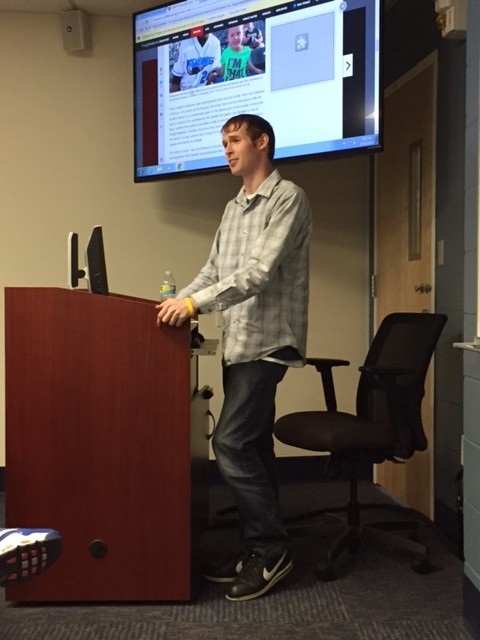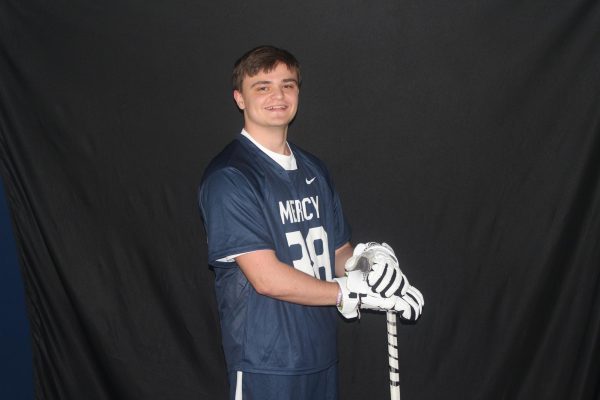“Do you believe in the first deity? Supreme allegiance is a big thing to swear.”
You might hear that kind of conversation at the Adventurers Guild, the campus Dungeons & Dragons club.
One of the most influential games has made its way to the Mercy University campus. Dungeons and Dragons, better known as D&D, is a game set in a medieval fantasy world in which multiple players form a group and are led through an adventure by one player who assumes the role of the Dungeon Master, or storyteller to those who aren’t in the know.
This game allows players to role-play their characters almost as if acting like someone else. It lets players’ creative minds and personalities shine while connecting with others. This interactive storytelling, something modern interactive games preach, is not new and has been around since the 1970s.
Dungeon Master and Mercy University student Ian French shared his thoughts on the iconic game and more.
“D&D is commutative storytelling. I created the original story flow as the Dungeon Master, the person running the whole thing. Everyone else and their characters are going through the story.”
Gary Gygax and Dave Arneson created Dungeons & Dragons, which was first published in 1974 by Tactical Studies Rules (TSR). Inspired by tabletop wargames like Chainmail, which Gygax had co-designed, D&D introduced the concept of role-playing, where players controlled individual characters rather than entire armies. The original game was a boxed set of booklets that provided rules for combat, character progression, and dungeon exploration. D&D quickly gained popularity, attracting a dedicated fan base and establishing itself as the foundation of the tabletop role-playing game.
Throughout the 1980s and 1990s, D&D evolved through multiple editions, each refining the rules and expanding the game’s world. The gameplay fizzled and TSR sold it to Wizards of the Coast (best known for Magic: The Gathering), revitalizing the brand. The launch of Dungeons & Dragons 3rd Edition in 2000, along with the Open Game License (OGL), helped expand the game’s reach by allowing third-party creators to produce compatible content. Subsequent editions, including the highly successful 5th Edition in 2014, modernized the game and introduced it to new generations.
French went on to explain more about the iconic game.
“Their characters are like the main characters, and there is a certain level of kind of getting to play a character that you think is cool or interesting and also do that in a social setting. There are role-play video games and all of that certain sort of stuff. However, this adds that extra theater of the mind. There’s no limit to what you can do.”
French elaborates on what makes this game so unique.
“It is a fun exercise in creativity and always makes for a storytelling experience. I also enjoy doing that with my friends and in general.”
A tabletop game, the Dungeon Master leads the adventure with additional players. Players choose a character race (human, elf, dwarf) and class (fighter, thief, wizard), then roll dice to determine abilities, skills, and outcomes of actions. Gameplay is a mix of storytelling, strategy, and dice rolling, with the 20-sided die (d20) being the core mechanic for determining success or failure. The DM describes the world, presents challenges, and controls non-player characters (NPCs), while players interact with the environment, battle monsters, and complete quests. The game is open-ended, allowing for creativity and improvisation within structured rules.
French joined the club last year after seeing how well it was managed in previous years. But he stresses that game management is different from gameplay.
“Managing this club is something that I enjoy, and hopefully, it helps it thrive, although we have been having some difficulty with that, which is something that D&D is struggling with. A lot of people want to play D&D and not run D&D so I have been the only DM for a while now and trying to get other members of the club open to be Dungeon Masters.”
French continues on what makes this game so special.
“D&D is a great place to be yourself. As corny as it sounds, you tend to end up with many people from various communities. We have a lot of people from the LGBTQ community simply because they get to play as whoever they want to be, and that has a lot of appeal to it. When people play, they tend always to enjoy it as it is very fun to see that.”
Liangie Hugh, a first-year student and club member, also shared what drew him to D&D.
Hugh recalls getting into the game before even starting college when his friends suggested giving it a try. “My friends said we should play, and I thought, why not? I’m not doing much.”
For him, it was the creative aspect of the game that truly stood out. I love creating characters and developing their stories. It’s all about the storytelling. It’s fun to dive into a different world for a bit.”
Hugh has been a part of the D&D club since his first semester at Mercy University. “This is my second semester in the club. I found it by chance, was looking for something cool to check out, and thought I’d try it.”
He believes the heart of the game, beyond storytelling, is character building and role-playing.
“It depends on what you’re doing. If you’re the DM, world-building is key. As a player, role-playing and character-building make the game fun.”
Hugh also noted that D&D isn’t about creating the perfect character but rather about making one that fits the world and is fun to play.
“It’s not like competitive D&D. You don’t have to optimize your character. The key is ensuring the character fits into the world and is fun to play.”
D&D, as iconic as it is, D&D continues to showcase why it has such a big following. Allowing yourself to become someone else is something that people can resonate with, as it will enable you to escape from reality.
If you are interested in playing D&D, head down to Room MH109 on the Dobbs Ferry campus.







